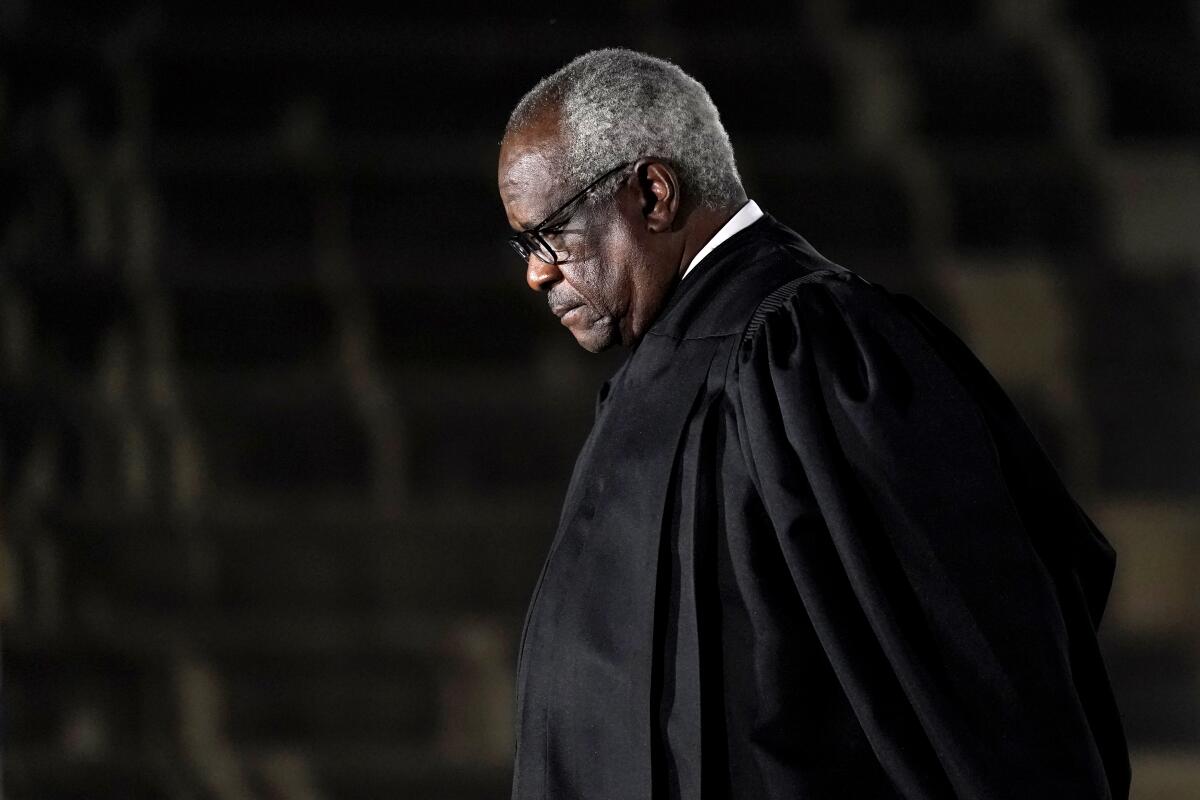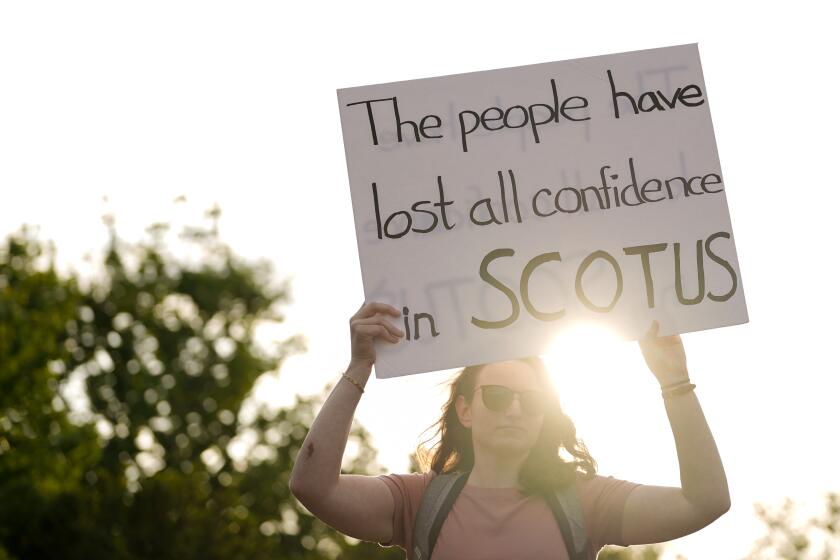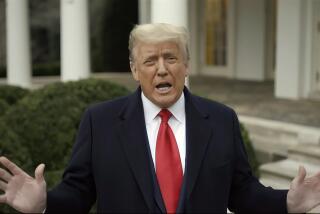Column: Clarence Thomas’ Jan. 6 conflicts of interest are showing again

Amid all the attention recently to “Trumpty Dumpty’s” do-over presidential candidacy, the midterm elections and Speaker Nancy Pelosi’s semi-farewell, one bit of Washington news was overshadowed but shouldn’t be. As with Donald Trump, we must not become inured to this other newsmaker’s travesties.
I’m talking about Supreme Court Justice Clarence Thomas.
Thomas has done it again. Last week the longest-serving justice on the nation’s highest court defied widespread calls from legal experts that he recuse himself from cases that have anything to do with the seditious events surrounding Jan. 6, 2021. You know, the failed coup in which Thomas’ wife, far-right political activist Virginia “Ginni” Thomas, was a participant. Worse, this latest case possibly implicates Ginni Thomas directly in what was an unprecedented attempt to thwart a peaceful transfer of power.
Opinion Columnist
Jackie Calmes
Jackie Calmes brings a critical eye to the national political scene. She has decades of experience covering the White House and Congress.
You don’t need to be a lawyer to see the justice’s conflict of interest here. Yet either Thomas doesn’t see it, or he doesn’t care. Neither speaks well of him. More broadly, his behavior reflects the impunity enjoyed by the life-tenured, virtually unaccountable justices on the court, from which there is no appeal.
In the case in question, another election denier, Arizona Republican Party chair Kelli Ward, sought to block a subpoena from the House Jan. 6 committee for her phone and text records. On Nov. 14 the court by a 7-to-2 vote denied Ward’s request. Even for the conservative court, it wasn’t a close call. The two dissenters? Right-wing Justice Samuel Alito and — shockingly — Thomas.
Why the shock? Because Ginni Thomas had emailed Republican state legislators in Arizona after the 2020 election, urging them to replace the state’s Biden electoral college slate with fake pro-Trump electors, one of whom was Ward. Also, Ginni acted on the basis of a much-disputed “independent state legislature” theory that is the subject of another case pending before the court. And she was questioned by the Jan. 6 committee, whose probe she called a “political persecution” of “citizens who have done nothing wrong.” As news outlets reported in March, Ginni sent at least 29 messages post-election to Trump’s White House chief of staff urging that Trump not concede, saying in one, “It takes time for the army who is gathering for [Trump’s] back.”
After the Supreme Court lurched to the far right on abortion, gun control and other fronts, ideas for placing limits on its power are proliferating.
If Clarence Thomas didn’t know about Ginni Thomas’ activities at the time — as she claims, implausibly — he certainly must know about them by now. And yet he blithely passed judgment on Ward’s petition, in a way that would have been favorable to her and adverse to the Jan. 6 committee’s inquiry.
Earlier, in February 2021, Clarence Thomas was the lone dissenter when the court rejected a Republican case from Pennsylvania seeking to throw out mail-in ballots from the 2020 presidential election. And he was alone again in dissent in January this year, when the court denied Trump’s bid to withhold his presidential records from the Jan. 6 committee.
“It’s becoming deja vu all over again again,” Stephen Gillers, a law professor and judicial ethics authority at New York University, said of Thomas’ repeated failures to bow out of Jan. 6-related cases.
It does not matter whether Thomas imposed or denied Sen. Lindsey Graham’s desired stay of a Georgia subpoena; he wasn’t supposed to rule at all.
“Thumbing his nose at the law,” Lawrence Tribe wrote in The Times, referring to a federal statute that calls for conflicted judges to recuse themselves. And that was before Thomas’ latest nose-thumbing in the Arizona case. Tribe was reacting to Thomas’ unilateral decision last month temporarily blocking a lower court order requiring Republican Sen. Lindsey Graham to testify before a Georgia grand jury investigating efforts to overturn that state’s 2020 vote for Biden. (The full Supreme Court later upheld the subpoena of Graham.)
As for the federal law Tribe references, it’s toothless. The law holds that federal judges and the nine justices “shall” recuse (that is, must) in cases where a spouse has “an interest that could be substantially affected by the outcome” — as Ginni Thomas did in the election-denial efforts — and where their “impartiality might reasonably be questioned,” as Clarence Thomas’ is. Yet there is no way to enforce the law; it is entirely up to a judge or justice to decide if he or she must recuse. Even Thomas’ colleagues — including the chief justice — can’t make him sit out a case.
“So Ginni can do political things that Clarence cannot,” Gillers, the law professor, told me, “and Clarence can do judicial things that Ginni cannot. Each can say that what the other does has nothing to do with them.”
The conservatives have embarked on a crusade of judicial activism against a raft of precedents, and not just on abortion.
The law aside, Thomas’ nose-thumbing is unethical: He is voting in cases where he has at least the appearance of a serious conflict of interest. If he’s indifferent to the mistrust his actions breed about him, he should at least care about how they reflect on the court itself. Americans’ disapproval of that institution is higher than it’s ever been in recent decades of polling.
Thomas’ failures to recuse have “reached the point that you’re hurting the institution,” says Gabe Roth, executive director of Fix the Court, a nonpartisan group seeking judicial accountability. “You have the responsibility to your colleagues in the institution to not take it down with you.”
More cases related to the unprecedented assault on the Capitol are certain to come before the Supreme Court, and it’s become all too clear that Thomas intends to cast his vote on each. The record suggests his vote may not matter. Nonetheless, his conflicted participation undermines the standing of the court. And that does matter.
Shame on him.
More to Read
Get the latest from Jackie Calmes
Commentary on politics and more from award-winning opinion columnist.
You may occasionally receive promotional content from the Los Angeles Times.















